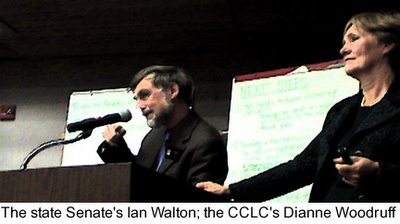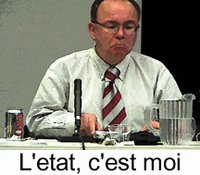

ast week, representatives of the district’s various constituency groups, including six members of the board of trustees, came together at Saddleback College to try to work out a mutually acceptable agenda of response to the Accrediting agency’s recent and worrisome recommendations. Once again, the agency has recommended
• overcoming unclarity concerning the various groups’ “duties and responsibilities,”
• ending the board’s pattern of micromanagement (obviously this is related to the first recommendation), and
• overcoming the climate of “despair.”
Here, I offer a small part of that larger discussion. I hope that you find it interesting and informative.
 THE SETTING:
THE SETTING: After presentations about district and college "governance" by the pleasant duo of Ian Walton and Dianne Woodruff, participants--maybe twenty people--took turns presenting “suggestions”—these were of varying specificity and quality; some were not suggestions at all—for responding to the accreditation recommendations.
The session yielded about 90 to 100 ideas.
Next, Walton and Woodruff sought to identify common themes from among the suggestions. When someone identified what they felt was a common theme, Woodruff or Walton would write the idea on a large pad of paper--a flip chart.
After themes were identified, Walton and Woodruff refereed as the group sought to define an agenda for action. Obviously, after each group's conception of its "roles and responsibilities" is identified, these conceptions need to be discussed.
But where?
Early on, “Chancellor’s Cabinet” was suggested. That group, which meets weekly, includes many but not all constituency groups. It does not include trustees.
Faculty and classified expressed various strong reservations about that setting:
• not all groups are represented;
• at those meetings, the Chancellor tends to declare his intentions rather than work with others;
• these meetings seem ill-suited to discussing broad philosophical issues; etc.
Eventually, Wendy noted that Chancellor’s Cabinet comprises mostly administrators, who nevertheless remain relatively quiet, perhaps owing to fear. Further, again, board members are not present at Chancellor’s Cabinet, and discussions about addressing the accrediting recommendations clearly need to include the seven trustees.
At Chancellor’s Cabinet, added Wendy, the board is represented by the Chancellor. She seemed to say that board members don’t really know what goes on at these meetings, since they are not present.
Trustee Fuentes took offense at that remark, which he interpreted imaginatively as the assertion of general board obliviousness or ignorance.
PEEVITUDE:
In his remarks, which I have transcribed below, Fuentes reveals just how far he is from recognizing the reality of trustee micromanagement. He reveals, too, a disinclination to embrace the communitarian nature of the night’s meeting—it was, after all, an attempt to have all groups work with other groups to arrive at mutually acceptable ideas and strategies re the accreditation recommendations.
I have provided both transcripts and an audio file.
I should explain that, in the end, the group agreed to adopt Glenn Roquemore’s suggestion: that each of the groups should first work on their own to define their duties and responsibilities. Subsequently, representatives would come together for discussion.
Eventually, Walton and Woodruff would return to referee another meeting, including all constituency groups.
As Wendy reminded the group, much of this work must be completed before summer!

TRUSTEE FUENTES: …We’re talking here about addressing concern that some have expressed about some, quote, “micromanagement.” If that is a valid concern, if there is micromanagement by some members of the board [then?] --the reverse of that, concern about macromanagement by those who’ve not had that responsibility is an equal concern of this board. And I just don’t think that all of that can go unchallenged. We board members have enormous contact with the community, with students, with the people that helped make up this district—not just those on payroll. And to suggest that the board is ill-informed—I take offense at that.
WENDY: I didn’t mean [to say]…that you’re ill-informed, just I want us to get to work together on this in the same room, and the board [members] aren’t on the Chancellor’s cabinet…
…..
WALTON: if it goes out to the groups to clarify the roles as you’ve suggested…, and then it comes back –have we reached agreement that in fact it should come back to another facilitated group that looks like this? [–Trustee Fuentes interrupts:]
FUENTES: again you’re coming back to this “what we have agreed to.” It’s not an evening of agreement. It’s an evening of listening. It’s an evening of sharing. So let’s move on from that. That’s what we agreed to on our agenda. We’re gonna hear the input from all these good people—we had the opportunity to hear a hundred marvelous suggestions. The board is not venturing into any kind of decisional agreement this evening…
WALTON: That’s absolutely true. We’re just trying to tell what we should write up here (on the board)—we’re trying to only write up here things that we think everyone has expressed agreement with. That doesn’t lock the board into any action....
AUDIO (CLICK):
Warning: there's some sort of feedback howl in the first half of this audio file, so watch your volume:

THE ACCREDS: YOUR TRUSTEES JUST DON'T GET IT
...[O]ne board member indicated that he had never seen any evidence of micromanagement. It is not clear to what extent this sentiment is shared by other board members but several of them seemed to be sympathetic to this point of view. As a result, it is hard to sort out in such a short meeting if SOCCCD Trustees do not understand what behaviors constitute micromanagement, if they are in denial about their own micromanagement, if some of them rationalize their own micromanagement as being appropriate in certain circumstances, if it is a habit that is difficult to stop, or if some of the trustees fundamentally believe that no outside agency has the right to regulate their behavior. [Bingo.] [I]t is clear that the SOCCCD board has not ceased its involvement in college and district operations.... (From the Accred report for Saddleback College.)




No comments:
Post a Comment